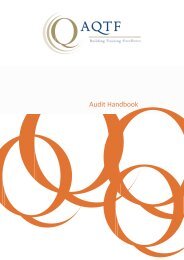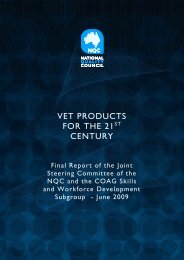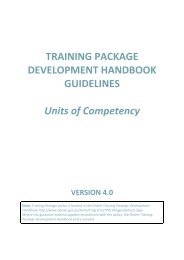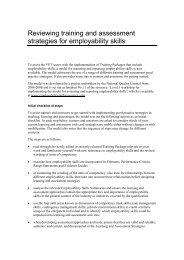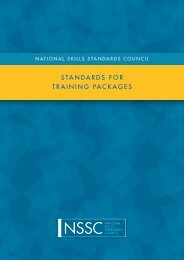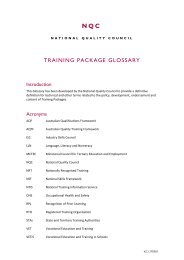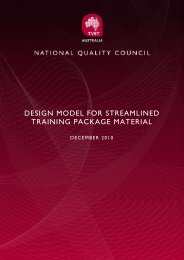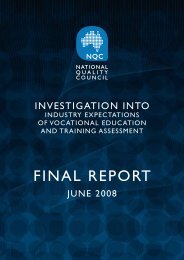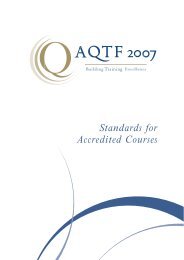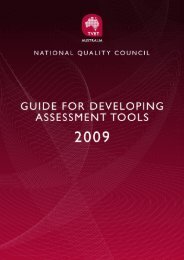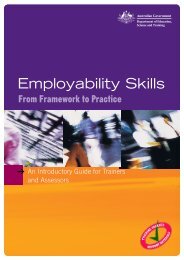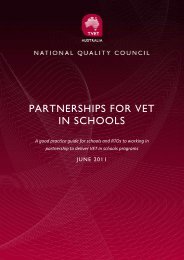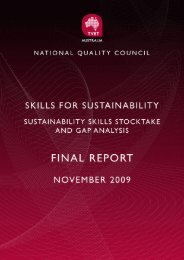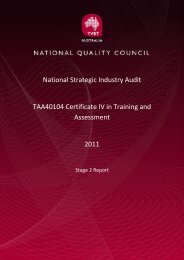Training package development handbook guidelines
Training package development handbook guidelines
Training package development handbook guidelines
Create successful ePaper yourself
Turn your PDF publications into a flip-book with our unique Google optimized e-Paper software.
If there is a chain of pre‐requisites, that is, Unit C is a prerequisite for Unit B, which is a prerequisite<br />
for Unit A, the pre‐requisites must all be shown in the unit pre‐requisites table. The chain of prerequisites<br />
must be included in the total number of units required for the qualification.<br />
13. Skill Sets<br />
13.1 Definition<br />
Skill Sets are defined as single units of competency, or combinations of units of competency from an<br />
endorsed <strong>Training</strong> Package(s), which link to a licence or regulatory requirement, or defined industry<br />
need.<br />
13.2 Identifying Skill Sets in <strong>Training</strong> Packages<br />
On the basis of their research and industry consultation, developers of <strong>Training</strong> Packages have at<br />
least three options in relation to Skill Sets in a <strong>Training</strong> Package.<br />
• No national Skill Sets are identified for the <strong>Training</strong> Package.<br />
• Skill Sets are identified based on units from the <strong>Training</strong> Package.<br />
• Skill Sets are identified based on units from the <strong>Training</strong> Package combined with units from one<br />
or more other <strong>Training</strong> Packages.<br />
Skill Sets could be identified in a <strong>Training</strong> Package where the unit or group of units:<br />
• Meet requirements set by an agency external to the VET sector—for example, for a national<br />
licence, regulatory requirement or professional body membership.<br />
• Have a commonly understood meaning in the industry—for example, worksite induction<br />
requirements.<br />
• Constitute a specialist role that benefits from separate identification—for example, project<br />
management units that enable the individual to lead projects in their area of expertise.<br />
• Be a useful addition to a general qualification—for example Asian Cookery units added to a<br />
Hospitality qualification to provide a valuable extra set of skills; or a set of small business units<br />
that enable someone with a technical qualification to take on some specific small business<br />
functions.<br />
The <strong>Training</strong> Package should include all relevant information about the Skill Set. For example, in the<br />
first scenario above there might be additional requirements that need to be met such as using an<br />
assessor approved by the licensing authority, or paying additional fees.<br />
Provide information and advice about Skills Sets including:<br />
• Advice about other requirements of regulations that may need to be met such as any<br />
requirements for Australian citizenship or evidence of a certain period of work experience.<br />
• Advice about logical clusters that may meet industry needs.<br />
• Advice about pathways.<br />
• Advice about the circumstances under which Skill Sets, rather than a particular qualification,<br />
could be delivered – where this is appropriate.<br />
13.3 Skill Set design<br />
Developers should take the following points into account when designing Skill Sets:<br />
• <strong>Training</strong> Package developers should approach Skill Sets in the same way they approach the<br />
<strong>development</strong> of units of competency and qualifications. This includes considering logical skill<br />
GuidelinesQualFrameworks_V3_June 2010 V3 June 2010 Page 24 of 28



